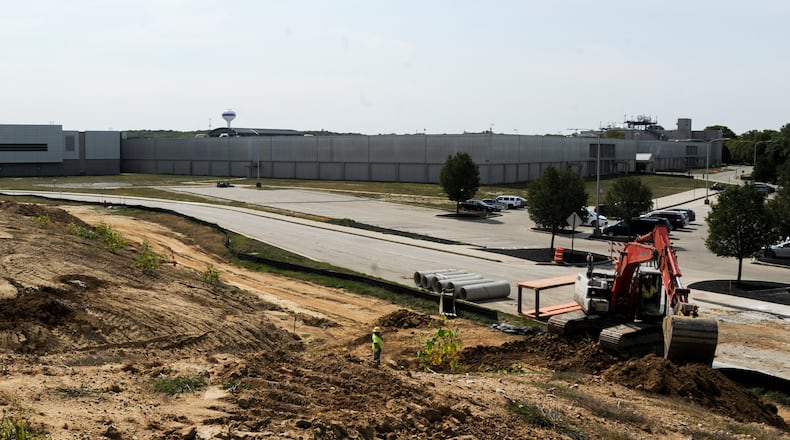Beyond the more than 30,000 military and civilian employees working directly at or for Wright-Patterson, the base is an economic engine for the region and much of the state.
That overall confluence of federal spending and research muscle is one reason why Ohio Gov. Mike DeWine recently said Ohio is “leading the nation into the aerospace age of the 21st century.”
But with yawning federal budget deficits, can that stature endure, under either a Democratic or Republican administration?
The budget deficit hit a record $3.1 trillion in the recently ended 2020 budget year, the nonpartisan Congressional Budget Office said earlier this month.
“Relative to the size of the economy, the deficit — at an estimated 15.2 percent of gross domestic product — was the largest since 1945, and 2020 was the fifth consecutive year in which the deficit increased as a percentage of GDP,” the CBO said.
The candidates and their plans
COVID-19 has dampened plans for defense spending and likely will continue to do so regardless of who wins next month’s election. The Pentagon’s five-year defense projection calls for mostly flat spending after 2021.
“We have this huge federal deficit, a record-setting federal deficit right now, because of COVID and all of the response effort that has gone into that,” said Todd Harrison, director of defense budget analysis at the Center for Strategic and International Studies (CSIS).
“And what we’ve seen in the past is, when we’ve seen record-setting deficits, within a few years, two or three years, policy-makers start to get concerned about that and try to do things to reduce the deficit by cutting spending," Harrison said.
Former Vice President Biden said recently he doesn’t foresee major reductions in the U.S. defense budget if he’s elected.
In a September interview with Stars and Stripes newspaper, Biden avoided making what that newspaper called “sweeping pronouncements” about defense spending.
“I don’t think (budget cuts) are inevitable, but we need priorities in the budget,” Biden was quoted as saying.
“We have to focus more on unmanned capacity, cyber and IT, in a very modern world that is changing rapidly,” Biden also said. “I’ve met with a number of my advisors and some have suggested in certain areas the budget is going to have to be increased.”
Trump oversaw defense budgets of $700 billion in 2018, $716 billion in 2019 and $738 billion for 2020, and he created a new military branch, the Space Force.
But even before the pandemic, Trump voiced concerns about the budget’s trajectory.
“We now have a very strong military. A lot stronger after this last budget. And then at some point very soon I’ll be able to cut back. But we had to rebuild our military,” Trump told the C-Span cable channel in July 2019.
The defense budget signed in late 2019 included a 3.1% pay increase for troops and the first-ever paid family leave for all federal workers.
Earlier this month, the U.S. Court of Appeals for the Ninth Circuit ruled that Trump illegally used defense funds to build sections of border wall in California, Arizona and New Mexico.
The court ruled that Trump evaded Congress' authority to spend public funds, authorizing the transfer of $2.5 billion from the Pentagon’s budget to be used in wall construction in El Centro in Imperial County, and in El Paso, Texas, Courthouse News reported
Congress had previously denied the funding.
A budget on ‘autopilot’
In the last two downturns in defense spending — in the second term of the Reagan administration and one that started in 2011 under the Obama administration — both were at least partially driven by concerns over the deficit, said Harrison of CSIS.
And therein lies the difficulty — or at least one of the difficulties. Most federal spending is on what Harrison called “autopilot."
“These are mandatory programs, like Social Security, Medicare, Medicaid, veterans' benefits and services that are basically locked in," he said. "And policy-makers are very reluctant to change those programs, because you’re cutting a benefit that has already been promised to current beneficiaries.”
Which leaves what is sometimes called “discretionary” spending.
“And defense is more than half of that,” Harrison said.
Credit: Airman 1st Class Heather Leveill
Credit: Airman 1st Class Heather Leveill
Mark Cancian, senior adviser in the international security program at CSIS, does not foresee large cuts in defense, no matter who wins Nov. 3.
“That’s the good news," Cancian said. "Now, deficits of course are soaring. And there’s this wild card of the pandemic.”
Even with that “wild card,” however, he doesn’t foresee dramatic cuts.
“I would not see large changes," he said. "I would see squeezing, and if there is any squeezing, Dayton would take a piece of that.”
One possibility may be a hiring freeze on civilian employees, he said. Cancian correctly notes Wright-Patterson is a sprawling, diverse base with with the Air Force Materiel Command headquarters, the National Museum of the U.S. Air Force, the Air Force Institute of Technology, widespread research and much more.
”We’re spending money we don’t have," Cancian said. “We’re sending the bill to our children and grandchildren. That can’t continue. (Former British Prime Minister) Margaret Thatcher said, at some point, you run out of other people’s money.”
Cancian and Harrison are in agreement that they don’t foresee a new round for a Base Realignment and Closure Commission, or BRAC. Harrison said that in the short term, BRACs tend to cost, rather than save, money.
Loren Thompson, a defense analyst with the Virginia-based Lexington Institute, believes Wright-Patterson is “safe” from stringent budget maneuvers.
“They’ll close the Washington monument before they slash spending at Wright-Patterson," Thompson said.
“Wright Patterson will fare well under either Biden or Trump," he said. “It is the nerve center of Air Force innovation and intelligence, and one of the largest employers in a critical swing state.”
About the Author




